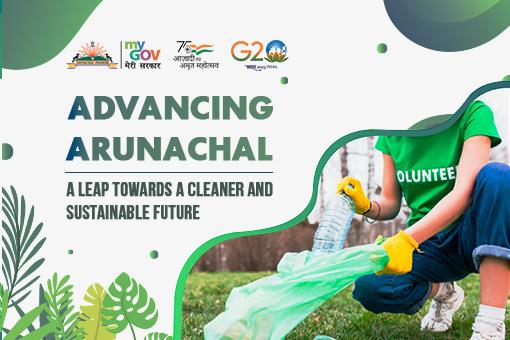Arunachal Pradesh in recent years, has been making remarkable strides in its journey towards progress and development. One of the key highlights of this advancement is the significant focus on enhancing solid waste management across major urban areas within the state. This proactive approach not only showcases Arunachal's commitment to a cleaner environment but also reflects its dedication to fostering sustainable growth.
One of the most commendable achievements on this front is the deployment of over 200 trucks and tippers dedicated to solid waste management. This strategic allocation of resources demonstrates the state's determination to address the pressing issue of waste accumulation effectively. By increasing the fleet for waste collection and transportation, Arunachal Pradesh as a progressive state has taken a vital step towards maintaining its urban areas in an organized and clean manner.
Another remarkable step is the substantial reduction in the solid waste collection and treatment gap. The state government's commitment to bridging this gap is indeed laudable, as it signifies a conscientious effort to align with global environmental standards. This reduction not only portrays Arunachal in a positive light but also serves as a testament to the administration's dedication to ensuring the well-being of its citizens and preserving the natural beauty of the state.
Equally noteworthy is the establishment of solid waste processing facilities and sewage treatment plants in key urban centers such as Itanagar and Pasighat. This forward-thinking approach underlines Arunachal's understanding of the importance of responsible waste management and its willingness to invest in the necessary infrastructure. These facilities are not just essential for the present, but they also lay the foundation for a more sustainable future by curbing pollution, promoting better hygiene, and safeguarding the state's unique ecosystem.
The state's commitment to embracing modern and sustainable solutions is paving the way for a cleaner, healthier, and more prosperous future. As Arunachal continues to make significant strides in waste management, it sets an inspiring example for other regions to follow suit, demonstrating that positive change is possible with dedication, vision, and responsible action.
Inviting citizens to share your ideas and feedback on how we can exemplify solid waste management in the state and make Arunachal Pradesh a clean and green region.













BrahmDevYadav 2 years 1 month ago
How can we save environment?
1.Protecting Our Planet Starts with us.
2.Ten Simple Things we Can do to Help Protect the Earth.
3.Reduce, reuse and recycle. Cut down on what we throw away.
4.Volunteer:- Volunteer for clean ups in our community.
5.Educate.
6.Conserve water.
7.Choose sustainable.
8.Shop wisely.
9.Use long-lasting light bulbs.
10.Plant a tree.
BrahmDevYadav 2 years 1 month ago
hy is the biodiversity in Arunachal Pradesh so rich?
Arunachal Pradesh is a land of vast forests, hills and mountains with deep gorges through which many rivers and streams flow. It is among the last regions with exceptional biodiversity that has persisted along with diverse indigenous communities, in part due to its remoteness and relatively inaccessible terrain.
BrahmDevYadav 2 years 1 month ago
Why is Arunachal Pradesh rich in biodiversity?
Arunachal Pradesh's forests are diverse, reflecting the state's varied altitudes and climatic conditions. The forests are classified into Tropical Forests, Subtropical Forests and Temperate Forests. Each type of forest is home to a unique set of flora and fauna, contributing to the state's rich biodiversity.
BrahmDevYadav 2 years 1 month ago
What are the environmental and natural resources of Arunachal Pradesh?
Among its resources for generating energy are rivers, coal, and petroleum; most of the state's power is provided by hydroelectric plants. In addition to hydrocarbons, other mineral resources of Arunachal Pradesh include dolomite, quartzite, limestone and marble.
BrahmDevYadav 2 years 1 month ago
What are the threats to wildlife in Arunachal Pradesh?
However, the region's unique biodiversity is under threat from multiple sources including habitat destruction, poaching and climate change. The deforestation, pesticide use and illegal wildlife trade pose significant threats to wildlife in the region.
BrahmDevYadav 2 years 1 month ago
What are the methods used in Arunachal Pradesh for water conservation?
Water harvested from the hilltops is mixed with domestic wastes as it passes through the village through small channels. Valleys are terraced into plots separated by 0.6 meters high earthen dams supported by bamboo frames. All plots have inlet and outlet on opposite sides.
BrahmDevYadav 2 years 1 month ago
What is the most common disaster in Arunachal Pradesh?
Arunachal Pradesh is under earthquake zone-V and is also highly prone to natural disasters like flood, land slide, cyclone etc. Every year with the onset of monsoon, landslide and flood cause havoc to lives and properties of the people.
BrahmDevYadav 2 years 1 month ago
What is the pollution of Arunachal Pradesh?
The current PM2.5 concentration in Arunachal Pradesh is 1 times above the recommended limit given by the WHO 24 hours air quality guidelines value.
BrahmDevYadav 2 years 1 month ago
What are the five environmental issues in Arunachal Pradesh?
1.Water pollution:- Water pollution is one of the biggest problems in India.
2.Air pollution:- Air pollution is also one of the major problems in India.
3.Waste pollution.
4.Noise pollution.
5.Climate change.
BrahmDevYadav 2 years 1 month ago
What is waste management best practices?
The ideal waste management strategy is “reduce, reuse and recycle.” Reducing waste generation and disposal requires an efficient waste management strategy. To enhance resource recovery, proper waste segregation is essential.